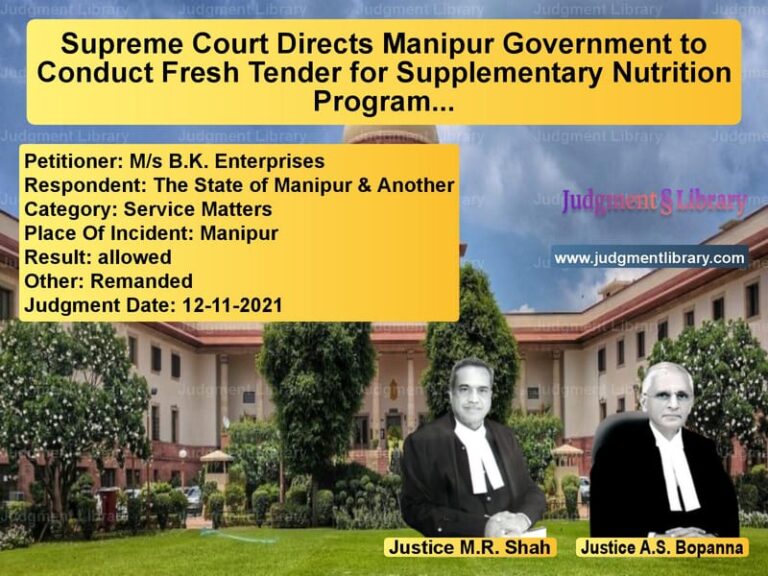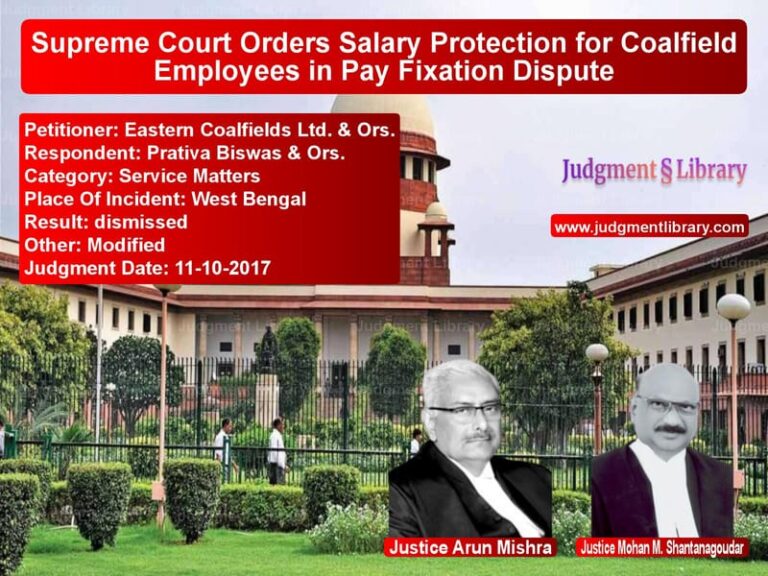Aish Mohammad vs. State of Haryana: Supreme Court Upholds Compulsory Retirement of Police Officer
The case of Aish Mohammad vs. State of Haryana & Ors. involves the compulsory retirement of a police officer in Haryana. The Supreme Court, in its judgment dated June 14, 2023, upheld the decision of the Haryana government to retire the appellant, a Head Constable, in the public interest after he turned 55 years old. The ruling clarifies the legal framework surrounding adverse remarks in the Annual Confidential Report (ACR) and the power of senior officers to review or expunge such remarks.
The appellant, a former Head Constable in Haryana Police, challenged his retirement order, arguing that his adverse remarks had been expunged by the Inspector General of Police (IGP). However, the Director General of Police (DGP) later reinstated the remarks, leading to his compulsory retirement. The Punjab and Haryana High Court ruled against him, and the Supreme Court upheld this decision.
Background of the Case
The appellant, Aish Mohammad, joined Haryana Police as a Constable on January 15, 1973, and was promoted to Head Constable on December 6, 1993. His service record included adverse remarks due to complaints of corruption, insubordination, and dereliction of duty. The sequence of events leading to his retirement is as follows:
- A complaint by Assistant Sub-Inspector Basant Pal led to an inquiry, resulting in his reversion from Head Constable to Constable.
- After a representation, his punishment was modified to stoppage of one increment instead of reversion.
- Between 1999 and 2000, he received adverse remarks in his ACR.
- His initial representation to expunge these remarks was rejected, but a second representation in 2005 was accepted by the IGP, leading to their expunction.
- In September 2006, the DGP issued a show-cause notice, arguing that the IGP had unduly favored the appellant by removing the adverse remarks.
- In October 2006, the DGP restored the adverse remarks and recommended his compulsory retirement.
- On September 8, 2008, a formal retirement notice was issued under Rule 3.26(d) of the Punjab Civil Services Rules, 1934.
- The appellant’s challenge in the High Court was initially successful, but the State of Haryana appealed, leading to a ruling in favor of the government.
Key Legal Issues
- Whether the Inspector General of Police (IGP) had the authority to expunge adverse remarks in the appellant’s ACR.
- Whether the Director General of Police (DGP) had the power to reinstate these remarks and order the appellant’s retirement.
- Whether the process followed in the appellant’s compulsory retirement was legally valid.
Supreme Court’s Analysis and Judgment
1. Authority to Expunge Adverse Remarks
The appellant argued that since the IGP had expunged his adverse remarks, they should not have been reinstated. However, the Supreme Court ruled:
“The IGP’s action in expunging the adverse remarks was beyond his authority, as he was reviewing the decision of his predecessor, which is not permitted under the Punjab Police Rules.”
The Court noted that under Rule 16.28 of the Punjab Police Rules, only a superior officer has the power to review or modify the orders of a subordinate officer, not an officer of the same rank.
2. Power of the Director General of Police
The Supreme Court upheld the DGP’s power to reinstate the adverse remarks, stating:
“The Director General of Police, being the highest-ranking officer in the state police, had the authority to review irregularities in administrative decisions and correct them where necessary.”
Since the expunction of adverse remarks led to an incorrect assessment of the appellant’s service record, the DGP was justified in restoring them.
3. Validity of Compulsory Retirement
The appellant’s retirement was ordered under Rule 3.26(d) of the Punjab Civil Services Rules, 1934, which allows the government to retire an employee after 55 years if it is in the public interest. The Supreme Court ruled:
“Compulsory retirement is not a punishment but an administrative decision based on an officer’s service record. Since the adverse remarks were validly restored, the decision to retire the appellant was legally sound.”
The Court further held that principles of natural justice do not strictly apply in cases of compulsory retirement, as it is an administrative action rather than a disciplinary proceeding.
Final Ruling
- The Supreme Court upheld the compulsory retirement of Aish Mohammad.
- It ruled that the DGP acted within his authority in reinstating the adverse remarks.
- The Court rejected the appellant’s claim that the IGP had the power to expunge his ACR.
- The judgment reinforced that government employees cannot claim an absolute right to continue service after 55 years.
Implications of the Judgment
The ruling has significant implications for police officers and other government employees:
- It reaffirms the principle that adverse remarks in service records must be taken seriously.
- It clarifies that officers cannot overrule the decisions of their predecessors without express legal authority.
- It upholds the government’s right to retire employees in the public interest.
- It limits judicial intervention in cases of compulsory retirement unless there is clear evidence of malice or arbitrariness.
Conclusion
The Supreme Court’s decision in Aish Mohammad vs. State of Haryana upholds the importance of maintaining discipline and integrity in government services. By validating the DGP’s decision to reinstate adverse remarks and retire the appellant, the judgment reinforces that government employees must maintain a clean record to continue in service beyond 55 years. The ruling serves as a precedent for cases involving administrative reviews, service record disputes, and compulsory retirements in government institutions.
Petitioner Name: Aish Mohammad.Respondent Name: State of Haryana & Ors..Judgment By: Justice Vikram Nath, Justice Ahsanuddin Amanullah.Place Of Incident: Haryana.Judgment Date: 13-06-2023.
Don’t miss out on the full details! Download the complete judgment in PDF format below and gain valuable insights instantly!
Download Judgment: aish-mohammad-vs-state-of-haryana-&-o-supreme-court-of-india-judgment-dated-13-06-2023.pdf
Directly Download Judgment: Directly download this Judgment
See all petitions in Public Sector Employees
See all petitions in Termination Cases
See all petitions in Disciplinary Proceedings
See all petitions in Judgment by Vikram Nath
See all petitions in Judgment by Ahsanuddin Amanullah
See all petitions in dismissed
See all petitions in supreme court of India judgments June 2023
See all petitions in 2023 judgments
See all posts in Service Matters Category
See all allowed petitions in Service Matters Category
See all Dismissed petitions in Service Matters Category
See all partially allowed petitions in Service Matters Category







